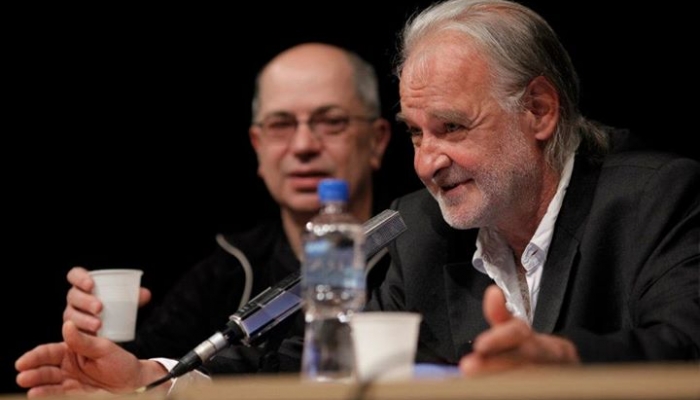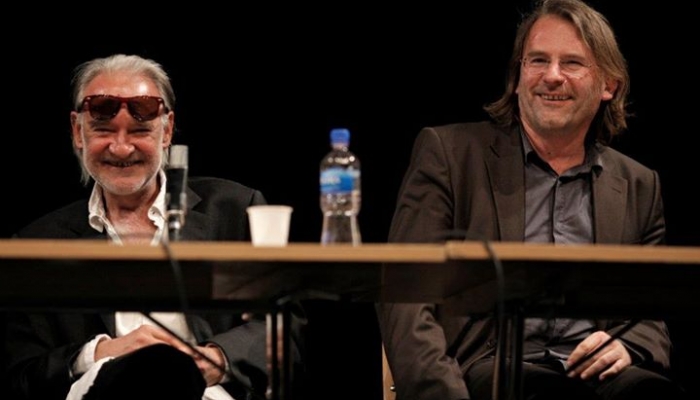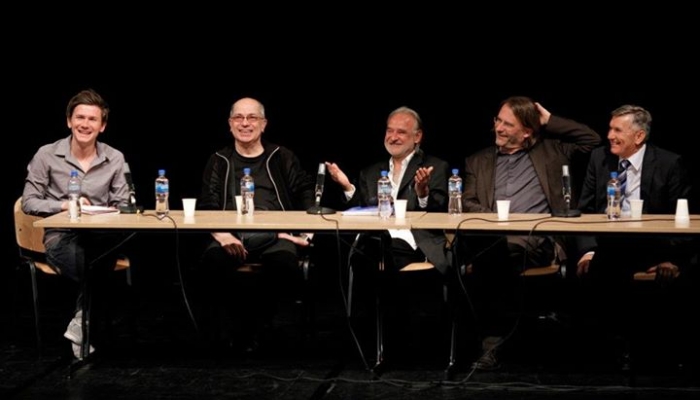Béla Tarr presents his post-graduate film course curriculum



Zagreb, 10 May 2012 – At yesterday's press conference that took place in the premises of Zagreb’s Academy of Dramatic Art, renowned Hungarian director Béla Tarr presented the curriculum of the post-graduate film course which should begin this autumn in Split. The conference speakers were Head of the Croatian Audiovisual Centre Hrvoje Hribar, Assistant Minister of Culture Vladimir Stojsavljević, Split University Rector Ivan Pavić, assistant dean for inter-university, inter-faculty and international collaboration at the Academy of Dramatic Art in Zagreb Bruno Gamulin and Béla Tarr, the initiator of the project.
Hrvoje Hribar, Head of the Croatian Audiovisual Centre, underlined Croatia’s strategic role in this project at the beginning of the conference. Croatia, so small and awkwardly located, should serve as a communicator country: it should provide networking and space where some old things could be rearranged into new combinations. It is a combination of talent and energy in a group of people who made a name for themselves with their work, said Hrvoje Hribar.
Ivan Pavić, Split University Rector, explained the importance of this project for the University of Split. Having in Croatia one of the leading people from the field of film, Mr. Béla Tarr, is a great honour and a great privilege. The University of Split accepted the idea and the initiative to serve as location for the project, and it also supports the organiser’s idea that the course participants should be the finest candidates not only from Croatia, but worldwide. To that end, the University of Split will not spare the effort to bring this marvellous idea to life as soon as possible so that we may enrol our first students this autumn.
Assistant Minister of Culture Vladimir Stojsavljević supported the project on behalf of the Ministry of Culture. Any kind of teaching is very difficult and ambitious, especially when art experience and skilful mastery are concerned. I believe this is a fantastic situation. Even talking to Mr. Tarr is a great opportunity for all those interested in film. In that sense, the Ministry believes this to be one of this year’s most important projects to back.
Bruno Gamulin, assistant dean for inter-university, inter-faculty and international collaboration at the Academy of Dramatic Art, welcomed the media representatives, professionals and students, and expressed his best wishes to the launch of this film school. He added that Zagreb’s Academy would still play an important role as a first step for the enrolment in the new school, because it enabled undergraduate and graduate education to future filmmakers and artists.
Béla Tarr, the initiator of the project, began his address by explaining what triggered the idea of opening a film school. The idea came to me when I made my last film, after the experience of teaching at different places in the world. To my view, it is impossible to teach art, because every artist is different: they have their language and cultural background, they possess a talent of their own. In order for that talent to develop, they need to be free and brave. This is why I want this film school to give them a chance to do what they want. Myself and other teachers will support that process, protect them and put them “under an umbrella”. Because once they enter the film industry, they will suffer enough pain and humiliation, and here they can learn how to resist that.
Later on, Tarr explained that the curriculum was envisaged as a three-year post-graduate film course. The first year will take 16 international students, who will apply with their works and CVs. The classes are meant as a combination of three elements: theoretical courses, workshops with renowned international filmmakers and practical work. This means that each of the students will be required to make a film and a video project because, according to Béla Tarr, it is important that they should learn how to handle both formats.
The list of lecturers at the Split film school is truly impressive. During the first year, the course participants will have a chance to learn from a series of renowned award-winning filmmakers, such as American director Jim Jarmusch, Palme d’Or winner Gus Van Sant, Finnish director Aki Kaurismäki, Mexican Carlos Reygadas, Canadian Atom Egoyan, and one of the most important Icelandic filmmakers Fridrik Tor Fridriksson. Also, there are acclaimed German cinematographer Fred Kelemen and Oscar-winning actress Tilda Swinton, who will teach the students how to work with actors.
Theoretical background will be the domain of Jytte Jensen, curator at the MoMA Department of Film, Jean-Michel Frodon, editor-in-chief of the prestigious film magazine Cahiers du Cinéma, Jonathan Romney, The Guardian’s film critic, Jonathan Rosenbaum, film critic and historian, and a series of other renowned names who will introduce the participants to different aspects of film theory and history.
This will be our freshman year curriculum. All these people confirmed their participation, the schedule is ready and everyone has their arrival and departure date, said Béla Tarr. Also, he said that screenings of films analysed within each course would take place at Karaman cinema would be public, as well as historical/theoretical lectures.
After the presentation of the school’s curriculum, Béla Tarr answered the numerous questions from the audience. He said that in the first three years the programme will focus on directors and cinematographers. There are also thoughts on expanding the curriculum to include the education of other filmmakers as well. He explained that the post-graduate course would not have age limits and that its price will be adapted to the prices of other post-graduate courses in Croatia. Also, Tarr added that a financial structure for the school is being devised, including Croatian ministries, European cultural funds, private donors and foundations, such as Korean Film Academy, as financiers. The school’s structure formally belongs to the University of Split.
Finally, Béla Tarr explained the concept of the entire school. You need to understand that this is more of a laboratory in which we can work and create together. Like the Bauhaus in architecture: something between education and a movement, with a spirit of the whole school which is important and based on freedom.
The Split film school should open its doors on 15 September, at the opening of the 17th Split Film Festival, with the application procedure. More concrete work should begin in February 2013.
More photos available at the Facebook profile of Croatian Audiovisual Centre.
Photo by: Danko Vučinović
